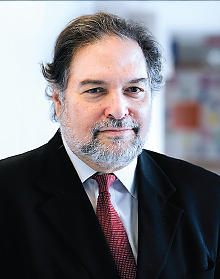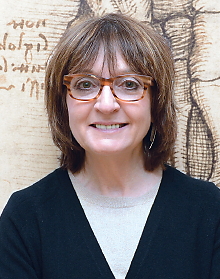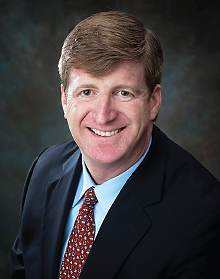Science, advocacy, and perspectives on language and mental health will come together in a special “Conversation” event at this year’s annual meeting featuring APA President Paul Summergrad, M.D., groundbreaking researcher and neurologist Helen S. Mayberg, M.D., and former Rep. Patrick Kennedy.
The three will meet on stage at the Toronto Convention Centre at 5:30 p.m. on Sunday, May 17, immediately after the Opening Session, for a discussion on “Science, Advocacy, and Talking About Mental Health.”
Summergrad, Mayberg, and Kennedy will engage in a thought-provoking and wide-ranging conversation about neuroscience opportunities in psychiatry, the role of advocacy, and the challenges of talking about complex neuropsychiatric illness and mental health more broadly.
“This year’s conversation will be a special event, and one that I think our members will remember,” Summergrad said. “Helen Mayberg is one of psychiatry’s modern-day pioneers. Her research into the role of the subcallosal cingulate region of the brain—known as ‘area 25’—in depression and other mental illness has been groundbreaking. Her advances in testing deep brain stimulation to treat depression have offered our patients another reason to be hopeful that treatment is possible, even in circumstances that have seemed intractable, and have given our profession another tool in an expanding array of scientifically based treatment options.
“Patrick Kennedy is a true friend to psychiatry and to people everywhere who struggle with mental illness,” Summergrad said. “His leadership role in helping to pass the federal parity law is a lasting contribution, and he continues to be a fearless, outspoken advocate for justice for the patients we treat. And he has been selfless in sharing his own personal history with mental illness and substance abuse. I look forward to a conversation with our guests that will be lively, informative, and provocative.”
In remarks to Psychiatric News, Mayberg said she hopes to bring to the conversation a perspective that reflects the deepening appreciation of the complexity of mental illness. “As a neuroscientist and a neurologist, I believe that we need to take every opportunity to understand how other disciplines see the study of mental illness to find ways to thoughtfully incorporate everything we learn from all vantage points,” she said.
“But if the problem—understanding and treating mental illness—were easy, we would have solved it already,” she continued. “Over the last 20 or 30 years, our view of mental illness has not gotten simpler, but more complex. Genetics, nature and nurture, brain circuits—the story for all of the illnesses we study and treat has gotten more complicated.
“On the good side, it has given us avenues for exploring new treatments,” she added. “One size doesn’t fit all patients. We need to move toward personalized, precision medicine models as has been done with heart disease, cancer, and infectious disease to help us maximize the effectiveness of treatments for individual patients.”
Kennedy has become a familiar face to APA members. In comments to Psychiatric News, he said this year’s annual meeting event is part of an ongoing conversation that promises to transform American health care.
“I have enormous personal respect for Drs. Summergrad and Mayberg, both of whom I have been privileged to know over many years and on whom I have relied for advice and counsel regarding national public policy and health care reform,” he said. “This is an incredible moment in time when everyone senses we are really on the precipice of fundamental change in the way we treat those with mental illness and substance abuse disorders.
“What is rapidly coming into view for the first time is a picture of what comprehensive, whole-person treatment would look like in a system that doesn’t segregate mental health from overall health,” Kennedy said. “I think everyone agrees that is the optimal treatment for people with mental illness as well as all of us with general medical conditions that can be complicated by mental illness.”
As noted by Summergrad, Kennedy has been candid—in past remarks to APA members and elsewhere—about his own history of mental illness and substance.
“The most fundamental challenge we have in addressing this subject is the fear and stigma that are conjured by mental illness, because our illnesses and symptoms are often confused as examples of bad moral character,” he told Psychiatric News. “I have been blessed to speak as a consumer of mental health and substance abuse services and can speak from my own history about what has worked to help me get better. At the same time, I can also wear the hat of one who has worked to seek justice for those who are denied care because of their inability to access quality mental health treatment.” ■



